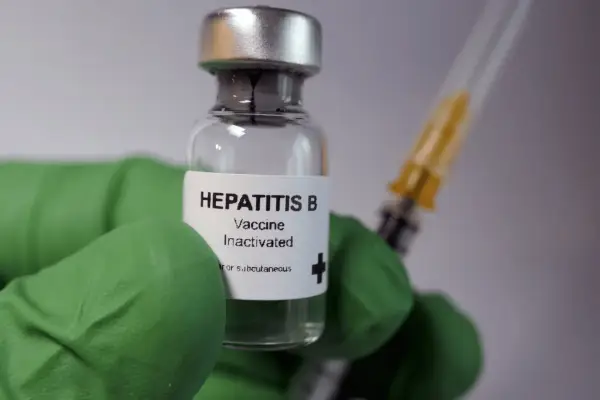![Healthy Matters]() Pharmacist Tips | Dosages | Side effects
Pharmacist Tips | Dosages | Side effects![Healthy Matters]() Nutritionist Tips | Facts | Precautions
Nutritionist Tips | Facts | Precautions![Healthy Matters]() Practitioner Tips | Dosages | Side effects
Practitioner Tips | Dosages | Side effects![Healthy Matters]()
![Healthy Matters]()

Hepatitis B: How to Spot the Silent Killer?
11 min read

Hepatitis B is a contagious liver disease known as the "silent killer" because most people can be unaware of their infection for up to decades until it causes life-threatening diseases such as cirrhosis, liver cancer, and other severe complications. Fortunately, hepatitis B can be prevented by vaccination and spotted early through HBsAg blood tests. Read on to learn more about hepatitis B and its vaccination.
What is Hepatitis B?
Hepatitis means ‘inflammation of the liver’. Hepatitis B is a viral infection caused by the hepatitis B virus (HBV) that attacks the liver. It’s a highly contagious disease. The World Health Organization estimates that 296 million people were living with chronic hepatitis B infection in 2019, with 1.5 million new infections each year.
Not everyone who is newly infected with HBV experiences symptoms, but those who do may experience fatigue, loss of appetite, stomach pain, nausea, and jaundice (yellow pigmentation of skin and eyes).
HBV is most commonly transmitted from mother to child during birth and delivery, as well as through contact with infected blood or other body fluids during unsafe (unprotected) sex, sharing injection needles, toothbrushes, or razors with an infected person.
Some infected patients will develop a chronic infection that may lead to serious or life-threatening liver problems such as cirrhosis or liver cancer. Fortunately, hepatitis B is a short-term illness for many people and is preventable by vaccination. Simple blood tests can diagnose hepatitis B infections, and there are effective drug therapies to manage hepatitis B infections.
Why is hepatitis B called a silent killer?
Hepatitis B is often called a silent killer because many people do not experience any symptoms for up to decades before symptoms manifest. As a result, these asymptomatic HBV carriers are unaware that they are infected and can unknowingly spread the virus to others, continuing the silent spread of hepatitis B.
People who are chronically infected but do not show any symptoms are still suffering silent liver damage that can lead to serious liver diseases such as cirrhosis or liver cancer. When many people discover they are infected, it is already too late and they have developed serious liver complications as a result of the infection.
Causes of Hepatitis B
Hepatitis B is an infection caused by the hepatitis B virus (HBV). HBV is transmitted from an infected person's blood, sperm, and other bodily fluids into the body of a healthy person. Hepatitis B can also be passed down from mother to child during pregnancy or childbirth.
A healthy person can acquire HBV through these activities:
- Unsafe (unprotected) sex with an infected partner without using a condom or other barrier contraceptives.
- Contact with an infected person’s blood or open sores
- Injections using HBV-contaminated needles, syringes, or other drug equipment such as spoons and filters.
- Injury to contaminated needle sticks or sharp instruments, which may carry blood from an infected person.
- Sharing items that can break the skin or mucous membranes with an infected person, such as razors, toothbrushes, and glucose monitoring equipment, potentially resulting in exposure to infected blood.
- Getting a tattoo or a body piercing in an unhygienic environment with unsterilized equipment
- Receiving medical or dental treatment in an unhygienic environment with unsterilized equipment
It is important to note that Hepatitis B is not transmitted through food or water, coughing, sneezing, or by casual contact including kissing, holding hands, hugging, or sharing kitchenware and utensils.
Risk factors of Hepatitis B
The following groups are at greater risk to become infected with HBV:
- Babies born to infected mothers: The virus can be transmitted from the mother to the baby during pregnancy.
- People born or raised in a country where hepatitis B is common
- Anyone who has had sex with someone with a known hepatitis B infection
- Anyone who has had unsafe (unprotected) sex, including anal or oral sex, especially with multiple partners, with someone in or from a high-risk area, men who have sex with men, and commercial sex workers.
- Anyone who has had close contact with someone who has had a long-term (chronic) hepatitis B infection, such as family members.
- Healthcare and public-safety workers are at risk for occupational exposure to blood or blood-contaminated bodily fluids.
- Anyone who has injected drugs in the past
- Patients on hemodialysis
Nevertheless, the risk of chronic infection is highest in young children as the risk varies with the age of infection. Approximately 90% of infants and 25 to 50% of children aged 1–5 years with hepatitis B become chronically infected. In contrast, only 2 to 6% of adults who get hepatitis B develop chronic infection, while 95 percent of adults recover completely from HBV infection and do not become chronically infected.
If you are at high risk, your doctor can arrange for a blood test to check for hepatitis B and have the hepatitis B vaccination.
Signs and Symptoms of Hepatitis B
Not everyone who has an acute HBV infection experiences symptoms. The presence of signs and symptoms varies with age. In adults, HBV infection typically causes no obvious symptoms and usually passes in 1 to 3 months without treatment. This is known as acute hepatitis B, and it rarely causes serious complications.
Children, in particular, have a lower ability to fight HBV infection, which is why hepatitis B can persist for years and eventually cause serious liver damage. Most children under the age of 5 and newly infected immunosuppressed adults are generally asymptomatic, whereas 30 to 50% of people over the age of 5 have signs and symptoms.
If symptoms appear with acute infection, they usually appear within 3 months of HBV exposure and can last for several weeks, but can persist for up to 6 months.
Acute HBV infections can cause the following signs and symptoms when they are present:
- Fever
- Fatigue
- Loss of appetite
- Nausea or vomiting
- Abdominal pain
- Diarrhea
- Clay-colored stool: stool that looks pale and greyish.
- Dark urine
- Joint pain
- Jaundice: a condition in which high levels of bilirubin (a yellow bile pigment) cause the skin, eye whites, and mucous membranes to turn yellow.
Many of these symptoms can be mistaken for more common illnesses, such as the flu or gastroenteritis. A blood test must be performed to confirm HBV infection.
Chronic hepatitis B occurs when the infection lasts for six months or longer. Without treatment, people with chronic hepatitis B can develop complications like cirrhosis (scarring of the liver).
Complications of Hepatitis B
Hepatitis B is associated with many serious and deadly complications. Approximately 25% of people who become chronically infected during childhood and 15% of those who become chronically infected after childhood die prematurely from cirrhosis or liver cancer, and the majority of people are asymptomatic until cirrhosis or end-stage liver disease develops.
If left untreated or not fully treated, hepatitis B can lead to these diseases or complications, such as:
- HBV reactivation: Recurrence or sudden increase in HBV in a patient with previously inactive chronic or resolved hepatitis B, usually when the patient receives new immunotherapy such as cancer therapy. HBV reactivation can be fatal.
- Hepatitis C or Hepatitis D Coinfection: both hepatitis viruses B, C, and D share similar modes of transmission, co-infection with the two viruses is not uncommon. Co-infection of multiple hepatitis viruses can lead to more severe liver disease and an increased risk for progression to liver cancer.
- HIV/AIDS Coinfection: HIV and hepatitis B have similar routes of transmission. Some antiretroviral therapy used to treat HIV can also be used to treat hepatitis B.
- Cirrhosis: Cirrhosis affects around 1 in 5 people with chronic hepatitis B, and usually does not cause any noticeable symptoms until extensive liver damage due to chronic hepatitis B has occurred. Cirrhosis currently has no cure, but it is possible to manage the symptoms and slow its progression. A liver transplant may be required if the liver is severely damaged.
- Liver Cancer: Around 1 in 20 people who have cirrhosis caused by hepatitis B will develop liver cancer every year. Treatment for liver cancer may include surgical removal of the affected section of the liver, a procedure or medication to destroy cancerous cells, or a liver transplant.
- Fulminant hepatitis B: Acute hepatitis B can progress to a very rare but serious condition known as fulminant hepatitis B in less than 1 out of 100 cases. The immune system attacks the liver and causes extensive damage to it, causing liver failure within days or weeks, and is often deadly if not treated promptly.
Screening and Diagnosis of Hepatitis B
If you find yourself in these risk groups or suspect you might have hepatitis B, talk to your physician so you can be screened for hepatitis B. the doctor will ask you to provide a blood sample, which will be used to conduct the hepatitis B panel blood test.
The hepatitis B panel includes three parts to determine whether a patient has acute or chronic HBV infection, is immune to HBV as a result of prior infection or vaccination, or
is susceptible to infection and in need of vaccination. The three parts of the blood test results are:
- HBsAg (Hepatitis B surface antigen): A positive HBsAg test result means that you are infected and can spread the virus to others through your blood.
- anti-HBs or HBsAb (Hepatitis B surface antibody): A ’positive’ or ’reactive’ anti-HBs (or HBsAb) test result indicates that a person is protected against the HBV as a result of successful recovery from a past hepatitis B infection or after receiving the hepatitis B vaccine. A positive anti-HBs (or HBsAb) test result means you are immune to HBV, cannot be infected, and cannot spread hepatitis B to others. If you have negative results, please consider hepatitis vaccination to protect yourself.
- Anti-HBc IgM is elevated: acute hepatitis B is reactivated.
It may take up to 6 months from the time of infection before a blood test can detect antibodies to hepatitis B, so follow-up testing may be required. During these 6 months, until you know whether you are infected or not, take precautions to avoid potentially infecting others.
When you are diagnosed with hepatitis B, you may need liver function tests or blood tests to assess liver damage caused by hepatitis B. These tests can be difficult to interpret, and specialist advice is required, so consult your doctor.
Treatments for Hepatitis B
Although there is no cure for Hepatitis B, some drugs may help to control the disease's progression. Early diagnosis of hepatitis B can prevent the development of severe liver complications. Since hepatitis B is often asymptomatic, you should get tested for HBV and detect the virus quickly if you have not already been vaccinated.
Treatment for hepatitis B is determined by how long you have been infected. Since there is no medicine to treat acute hepatitis B, if you have only been infected for a few days, weeks, or months, you may only require supportive treatment to relieve your symptoms while your body fights off the infection. Make sure to have enough rest, adequate nutrition, and fluid intake. Otherwise, for more severe emergencies, hospitalized treatment can be given soon after possible HBV exposure (most effective within 48 hours, or have them up to a week after) to stop an infection, and it can be either:
- A dose of the hepatitis B vaccine, plus two further doses over the next few months for long-term protection; or
- Hepatitis B immunoglobulin is a preparation of antibodies that work against HBV, and can provide immediate but short-term protection until the vaccine takes effect.
Most people recover completely within a few months, but after the infection, regular blood tests are recommended to ensure that you are free of the virus and have not developed chronic hepatitis B.
If your infection has persisted for more than 6 months (chronic hepatitis B), you may need long-term or lifelong treatment with medicines that keep the virus under control and reduce the risk of liver damage.
- Antiviral medicines reduce the number of viruses in your body and stop them from damaging your liver. Examples include Entecavir, Tenofovir and Telbivudine.
Nevertheless, you may get vaccinated against hepatitis A and tested for hepatitis C.
Prevention of Hepatitis B
Hepatitis B is a highly transmissible disease. Keep these in mind to prevent hepatitis B:
- Avoid multiple sex partners and unprotected sex. Always use condoms if you are unsure whether your sex partner is a carrier.
- Avoid sharing objects that may be contaminated with blood, for example, razors, toothbrushes, or needles for injection.
- Avoid acupuncture, tattooing, or ear piercing done with unsterile instruments.
- Avoid coming into contact with other people's blood or bodily fluids. Wear gloves while handling blood and bodily fluids.
- Disinfect blood spills (including dried blood, which can still be infectious) with a 1:10 dilution of one part household bleach to ten parts water. Wear gloves when cleaning blood spills.
Other than the above measures, vaccination is the best way to avoid hepatitis B infection. Hepatitis B vaccines can provide excellent (98 to 100%) protection against hepatitis B. Preventing hepatitis B reduces the risk of complications such as chronic liver disease and liver cancer. It is advised for all infants, young children, and adolescents, as well as those in high-risk groups. There are a total of 3 doses administered for 6-18 months. Until the vaccine series is completed, follow the precautions outlined above points to avoid possible infection. Learn more about hepatitis B vaccines here.
Pregnancy, childbirth, and Hepatitis B
Hepatitis B can be passed on to a baby during pregnancy or childbirth if the mother has it or is infected with it. The mother could become infected by the virus if she has sexual contact with an infected person, or if she comes into contact with infected blood.
In Hong Kong, Maternal and Child Health Centres (MCHCs) and hospitals under Hospital Authority provide a comprehensive shared-care program for expectant mothers, new mothers, and newborns. As part of her antenatal care, the mother should receive a hepatitis B blood test as well as checkups for other diseases or complications. Expectant mothers with high hepatitis B viral load should receive anti-viral treatment.
All children born in Hong Kong should be immunized against hepatitis B. The first dose is given in the hospital at birth, while the second and third doses are given in MCHCs. For babies born to carrier mothers, an additional hepatitis B immunoglobulin is given within 24 hours of birth to prevent transmission from their mothers. Vaccines are provided free of charge through Hong Kong Childhood Immunisation Programme.
Traveling with Hepatitis B
Hepatitis B is most commonly acquired in areas of the world where the infection is more prevalent. Hepatitis B is found all over the world, but it is especially prevalent in:
- sub-Saharan Africa
- east and southeast Asia
- the Pacific Islands
- parts of South America
- southern parts of eastern and central Europe
- the Middle East
- the Indian subcontinent
The risk of contracting hepatitis B for travelers visiting areas where the infection is common is generally low if activities involving contact with blood or other bodily fluids are avoided.
If you do wish to travel (especially to the places mentioned above), you may consult your family doctor or the Hong Kong Travel Health Service. The Travel Health Service offers hepatitis B consultation and vaccination to international travelers who plan to visit high-risk areas of communicable diseases.
Costs for Hepatitis B Tests and Vaccinations
Hepatitis B vaccination is free for eligible children born in Hong Kong after 1988 as it is included in the Hong Kong Childhood Immunisation Programme. Those who have not received the vaccination may require blood test screening and vaccination.
The cost of hepatitis B tests and vaccination varies in different privacy settings and would be determined by doctor consultation fees, medication fees, laboratory tests, imaging test charges, etc. In Hong Kong, the cost of each dose of the hepatitis B vaccine ranges from $200 to $350. To complete the full vaccination schedule, three doses are required.
The Family Planning Association of Hong Kong
- Specialist Consultation Fee: $400
- Investigation & Laboratory Tests:
- Liver Function Test: $250
- Hepatitis B Antigen Test: $140
- Hepatitis B Antibody Test: $140
For inquiries and appointments, call the Family Planning Association of Hong Kong at 2919 7721.
Department of Health’s Travel Health Service
- Health risk assessment and consultation: $315
- Hepatitis B surface antigen blood test: $275
- Hepatitis B surface antibody blood test: $275
- Hepatitis B vaccines: $60/dose, 3 doses needed.
For details, call the Travel Health Centres at 2961 8840 (Hong Kong) or 2150 7235 (Kowloon).
* All amounts are in HKD. No responsibility is accepted for any inaccuracies, errors, or omissions. It is always best to call ahead to make sure the information is still up-to-date.
FAQs
Hepatitis B is a contagious liver disease known as the "silent killer" because most people can be unaware of their infection for decades until it causes life-threatening diseases such as cirrhosis, liver cancer, and other severe complications. Hepatitis B is caused by the hepatitis B virus infection. It is prevented by vaccination and avoiding contact with infected blood or bodily fluids.
Yes, hepatitis B can be spread through unprotected (unsafe) sex. To avoid hepatitis B, practice safe sex, use a condom, and avoid multiple sex partners. If you suspect you have hepatitis B, do a screening test.
Most adults with hepatitis B recover fully, even if their signs and symptoms are severe. Infants and children are more likely to develop a chronic (long-lasting) hepatitis B infection. Hepatitis B can be treated using antiviral medications.
HBsAg (Hepatitis B surface antigen): A ’positive’ or ’reactive’ HBsAg test result means that the person is infected with hepatitis B. It tests the actual presence of the hepatitis B virus via its surface antigen marker in your blood. A positive HBsAg test result means that you are infected and can spread the virus to others through your blood.
This article was independently written by Healthy Matters and is not sponsored. It is informative only and not intended to be a substitute for professional medical advice, diagnosis or treatment. It should not be relied upon for specific medical advice.

Your health resource, made in Hong Kong
Healthy Matters is Hong Kong’s leading health resource. Our mission is to help you make better health decisions and take control of your health.
Our team of experts is committed to producing reliable health content that is accurate, engaging and relevant, to cover your health & wellness journey from prevention to treatment.
Whether you are looking for trusted information on health conditions, wellbeing or looking for the right doctor or service in Hong Kong, we’re here to help!
Your health matters. Begin your health journey with Healthy Matters today!
































